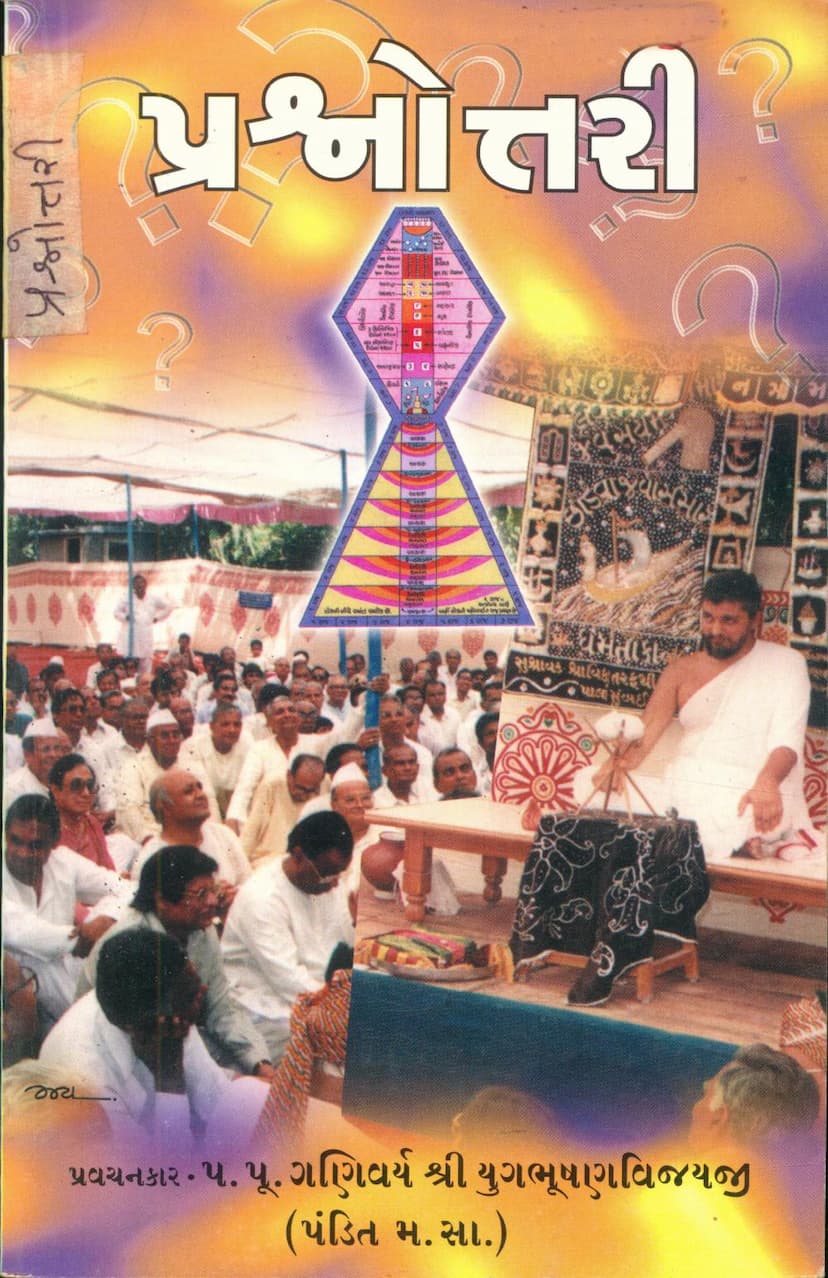Prashnottari
Added to library: September 2, 2025

Summary
Here's a comprehensive summary of the Jain text "Prashnottari" by Yugbhushanvijay, based on the provided pages:
Book Title: Prashnottari (Meaning Question and Answer) Author: P.P. Ganivarya Shri Yugbhushanvijayji M.S. (also referred to as Nana Pandit Maharaj) Publisher: Gitarth Ganga Catalog Link: https://jainqq.org/explore/005866/1
Overview:
"Prashnottari" is a collection of discourses given by P.P. Ganivarya Shri Yugbhushanvijayji Maharaj Saheb. These discourses, delivered in response to questions posed by an audience, primarily address profound philosophical, spiritual, and practical aspects of Jainism. The text aims to clarify complex concepts and provide guidance for spiritual seekers, particularly within the Jain tradition. The publication is a testament to the publisher's commitment to disseminating the teachings of ancient Jain scholars and contemporary spiritual leaders.
Key Themes and Content:
The book is structured as a series of questions and answers, covering a wide spectrum of topics discussed during the lectures. The central theme revolves around understanding the Jain perspective on various aspects of existence, karma, spiritual progress, and adherence to Jain principles.
Highlights from the Question-Answer Segments:
The text delves into numerous questions, offering insights from a Jain philosophical standpoint:
- Nature of Reality and the Soul: The discourses touch upon the fundamental nature of the soul (atma), its infinite potential (labdhi), and its relationship with the material world.
- Karma and Its Effects: A significant portion is dedicated to explaining the intricacies of karma, how it binds the soul, and its influence on life events, including lifespan and rebirth. The concept of akalan mrityu (untimely death) and its relation to karma and external factors is explored.
- Science and Jain Philosophy: The book engages with modern scientific concepts, comparing and contrasting them with Jain principles. It highlights how ancient Jain scriptures often contained profound insights that later scientific discoveries corroborated, such as the convertibility of elements.
- The Role of Spiritual Powers (Siddhi) and Miracles: The text clarifies that spiritual powers are manifestations of the soul's inherent capabilities and are not exclusive to deities or a creator God. It emphasizes that these powers operate within the framework of natural laws and karma.
- The Concept of God and Omnipotence: Jainism's unique perspective on God is presented, distinguishing it from the concept of an all-powerful creator. Jain philosophy emphasizes the power of the soul and the limitations of even divine beings in altering fundamental laws of nature or karma.
- The Nature of Death and the Afterlife: The discourses discuss the awareness of death, the impact of jati smaran jnan (knowledge of past lives), and how the understanding of death can be a catalyst for spiritual progress.
- Family Planning and Societal Norms: The book addresses contemporary issues like "two children are enough" (બે બાળક બસ), critically examining its implications from a spiritual and societal perspective. It advocates for adherence to traditional values and the importance of pure lineage (sujat santati).
- Historical and Mythological References: The text uses examples from Jain history, scriptures, and legends (like Gautam Swami's miracle with kheer, Shrenik's sons, Rishabhdev, Marichi, and the story of Nayasara) to illustrate complex principles.
- Practices and Rituals: Questions are posed about various practices, such as the meaning of "Jai Jinendra," the use of varakh (edible gold/silver leaf) in rituals, the significance of prayers and invitations, and the propriety of certain actions in temples and during religious observances.
- The Role of Gurus and Spiritual Guidance: The importance of following the teachings of enlightened spiritual guides and the need for discretion in accepting external spiritual influences are discussed. The nature of mithyatva (false belief) and its implications for spiritual progress are highlighted.
- The Soul's Journey and Liberation (Moksha): The ultimate goal of Jainism – liberation of the soul – is woven throughout the discussions, emphasizing the path of self-purification, detachment, and adherence to the path shown by the Tirthankaras.
- The Distinction Between Material and Spiritual Happiness: The text emphasizes that true and lasting happiness resides within the soul, not in transient worldly pleasures.
- The Concept of Leshya (Aura/Disposition): The book clarifies the meaning of leshya, differentiating between dravya leshya (material disposition) and bhava leshya (spiritual disposition), and their connection to karma.
- The Fivefold Causality (Panch Samvay): This crucial Jain principle, outlining the five essential causes for any event – time, nature, destiny, karma, and self-effort – is explained with examples, highlighting the intricate web of causes and effects.
- The Nature of Miracles and Divine Intervention: The book explores the Jain perspective on miracles, emphasizing that they are manifestations of advanced spiritual development rather than arbitrary acts of divine power.
- The Importance of Right Understanding and Discrimination: A recurring theme is the need for clear understanding and the avoidance of misinterpretations of Jain doctrine, particularly in distinguishing between authentic spiritual practices and those that are based on worldly desires or misconstrued beliefs.
Author's Perspective:
Ganivarya Shri Yugbhushanvijayji, a disciple of highly revered spiritual masters, is presented as a profound scholar and adept speaker. His discourses are characterized by their clarity, depth, and ability to connect complex philosophical ideas with everyday life. The book reflects his commitment to truth, honesty, and the dissemination of genuine Jain teachings.
Publisher's Mission:
The publisher, Gitarth Ganga, states its mission to analyze and present the profound teachings of ancient Jain scholars, such as A. Shri Haribhadrasurishwarji and Upadhyayji Shri Yashovijayji, making them accessible to the Jain community. While acknowledging that publishing these discourses might slightly deviate from their core focus, they deem it beneficial for the spiritual growth of seekers and have undertaken it as a supplementary activity.
Overall Significance:
"Prashnottari" serves as a valuable resource for anyone seeking to deepen their understanding of Jainism. It offers clear and authoritative answers to a wide range of spiritual and philosophical questions, presented in an accessible question-and-answer format. The book empowers readers to engage with their faith more thoughtfully and to navigate the complexities of life with the guidance of Jain principles.